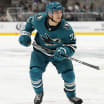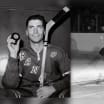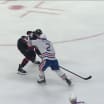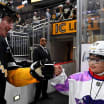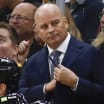Stars coach Montgomery out to 'prove I belong'
Hired from NCAA, 49-year-old focused on creating winning culture, returning to playoffs
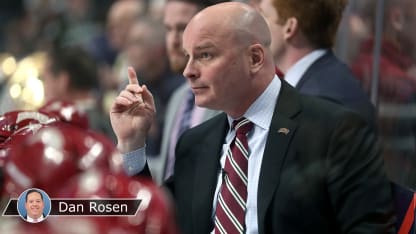
"I've got to prove I belong," Montgomery said about his first coaching job of any kind in the NHL. "And all the players have got to prove that they can bring a winner to Dallas, a team that can be thought of as a playoff team that can contend for the Cup."
The Stars hired Montgomery, 49, on May 4 from the University of Denver, where in five seasons his teams went 125-57-26 and won the 2017 NCAA championship. Now it's on him to lead a team that has made the Stanley Cup Playoffs twice in the past decade.
"I want to be the same coach I've been," said Montgomery, who played 122 games in six NHL seasons from 1993-2003. "I want to be a coach whose teams are known for being relentless and the culture we create is selfless. It doesn't matter who gets the credit as long as we're going toward the right direction. It's all about being team-first. That's the biggest challenge for any coach at any level."
Montgomery spoke to NHL.com about the culture he wants to create in Dallas, how he plans on making it happen, and expectations he has for some players who could be key to making or breaking the Stars season.
On selling himself and his program to top players like Jamie Benn, Tyler Seguin and John Klingberg: "I really believe that before you can sell anybody on anything you've got to get to know them and they have to get to know you a little bit. Naturally, players are going to question. I mean, it's human nature that when you think things should be done a certain way, whether we're talking systems or culture, that they're going to be a little bit inquisitive as to does this really work. I think the initial part is get to know them as people, let them know you're invested in them and the team and that it's not just coach-speak so to speak. Then when you begin to get into the nitty-gritty of the details of the on-ice minutia, they have more trust in that I'm doing this for the right reasons and let's give it a chance."
On what he's done to get to know the Stars players since taking the job: "Initially there was a handful here in Dallas, and I met with a lot of them here, had lunch with a couple in Dallas. I was able to go to Finland and Sweden and meet with the Finns and Swedes, and we had three Finns and two Swedes at that time. Then it's been a lot of phone calls, trying to get them to understand a little bit how I think and most importantly just getting to know them and getting to understand how they think. It's been a lot of asking them questions; simple questions like what's right in Dallas, what's wrong in Dallas, how do we get better? I just want to see how they think as people. Are they thinking about themselves, or are they thinking about the team first? I'm big on communication, and listening is the most important part of communication."
On his experience communicating with players of the current generation: "People say, 'How do you deal with millennials?' To me, hockey players are hockey players. I don't care if you go back to the Howie Morenz era to today's age, hockey players are a special breed to be around. Team-first, selfless people. I think that's why media in general like them and fans like them, because they're down-to-earth people. That really hasn't changed from what I've seen. But what has changed is communication skills, and it's nothing to their fault. As a parent, I think I'm a worse communicator than my parents were because of phones, just like these players are worse communicators than my generation of players were because we didn't have phones. We had to talk to each other. That was our entertainment. We've got to get these players comfortable talking and putting themselves out there, being vulnerable. There's nothing wrong with being vulnerable, and I just don't think they're in a lot of situations to do that in this day and age."
On what he's found the reaction to be from the players he has spoken to and gotten to know: "The first thing I noticed was as a whole this group is hungry and they understand they need to win. I guess the best way to say it is, all their minds are in the right spot and a lot of them realize the window is fast approaching and could close within four or five years. That was the nice part, how they all analyzed the team and that no one looked inwardly. That was a pleasant surprise that I wasn't sure would happen. Talking in general I feel is something they all need to get comfortable doing. It's not so much in a 1-on-1 environment but more in a group or team environment. That was something that they all said even though they may not have known they were saying it. They all relayed to me that that was something that needs to increase in our locker room."
On if he thinks his style of open communication will foster that growth: "This is the only generation I've coached as a head coach so this is how I know how to get the most out of them at the levels I've been at. It remains to be seen if I can do that here at this level. Everybody wants to be heard and everybody deserves to be heard, but if you want to create ownership in the Dallas Stars, I think the players have to have a voice and they have to know that that voice is not only being heard, but that it's actually going to be listened to. To me, that's the best way to create ownership. When players take ownership of the team, that's when you have something special. Vegas had something special last year. You could tell that everybody was all-in. Obviously, the head coach (Gerard Gallant), he did a fantastic job, but he set the parameters to allow people to be that close, to have that type of environment where it's a special culture and everybody is in it for the team. It's not easy to do. The same team can come back with the exact same players the following year and have a bad culture because people's mindsets change. That's life. Expectations change. That's why you've got to work on culture every day. It's a term that is overused these days unless you work on it every day because culture is so important. I've seen it. Last year at Denver, our culture wasn't as good as it was the year before. It all comes with expectations. Do you have the right leaders to push and pull people? Same thing with coaches. Are they as invested after they've had success?"
On rookie Miro Heiskanen and if it's realistic for him to be a top-four defenseman for the Stars this season: "That remains to be seen. He's an NHL defenseman. He's got an elite mind, elite skating. He's the modern-day defenseman. He does everything with his mind and his feet, and because of that, the Dallas Stars should play in their end less than they did last year and they should break pucks out cleaner. How quickly does he get the confidence to do that at the speed and pace of the NHL? As soon as he does that, he's a top-four defenseman, but that might take until post-Christmas."
On how much he knows about forward Valeri Nichushkin and what the expectations are for him now that the 23-year-old is back after two seasons in the Kontinental Hockey League: "We see him as a big part of our team. I like to play a puck possession game, and here's someone that can really possess and hold bodies off because of his size (6-foot-4, 205 pounds) and his strength and his length. And now he's coming back and he's a man now, not a teenager. Obviously, he's going to have to get acclimated to the North American style, but I think he's coming back with more confidence, size and strength, and he's going to add a lot to what the Dallas Stars are this year."
On if it's realistic to still consider Jason Spezza as a top player and scorer, or if expectations go down after last season, when he had 26 points in 78 games: "I expect Jason Spezza to be a big part of our team. If we're going to have balanced scoring throughout our lineup 5-on-5 and be able to have two power-play units that can score, Jason Spezza has to be the guy that ignites an engine for us for our balance. I know that he had a down year last season, but I know he's extremely motivated and he's working extremely hard at everything, including his skating and his diet. Here's a guy who is not satisfied. Here's a guy who is hungry to prove people wrong. I love it that Jason Spezza has that attitude."
On if Spezza could be on the first power play: "He's going to get the opportunity. I would like to see [Alexander] Radulov, Spezza and Seguin be interchangeable so we're not as predictable as I saw the power play was last year. In order for that to happen, all of them have to be interchangeable, and they have to play with pace and great purpose. He has the right mind and hand in a right shot and body type to be in there, but he has to be willing to take ownership of that. If not, we know that we can put him on the second unit and he can do a great job for us there, making that a serious threat every time they're on the ice. It's just a matter of seeing the chemistry and how it works."
On if power play improvement is a key area of focus after the Stars were 19th in the NHL last season (19.3 percent): "Taking ownership of the team, we talked about it, well, here's a part where those five guys have to take ownership of our power play so we can build momentum every time we're on it. The percentage doesn't always bother me. I think we should be higher than 19 with the talent that we have, but that being said, I want us to put people on their heels when we're on the power play. It's up to those guys to, even if they don't score in their minute, that the second power-play unit is coming over the boards to face tired penalty killers so they can go on the attack. That's the whole part of building momentum."






